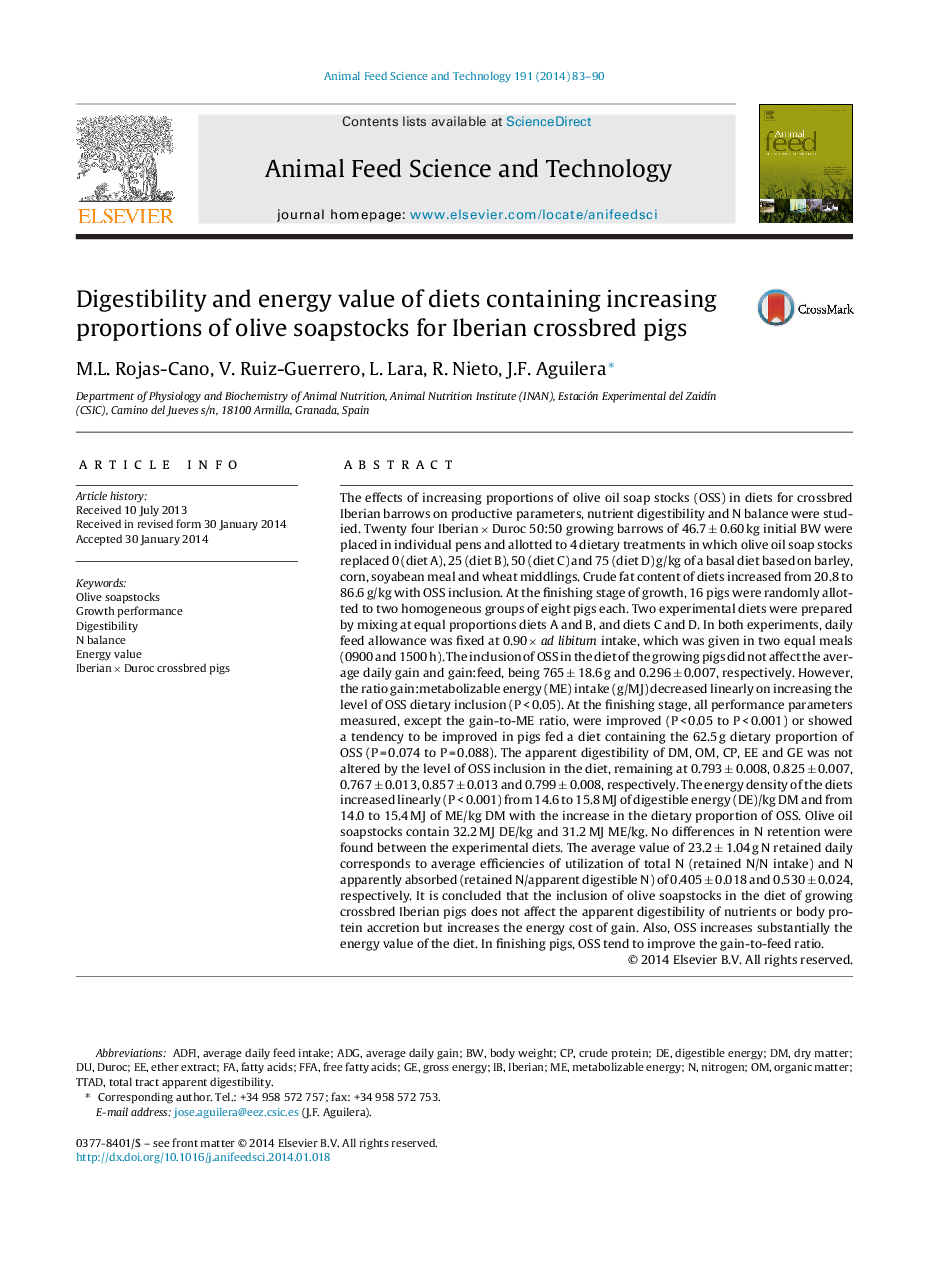| کد مقاله | کد نشریه | سال انتشار | مقاله انگلیسی | نسخه تمام متن |
|---|---|---|---|---|
| 2419605 | 1552394 | 2014 | 8 صفحه PDF | دانلود رایگان |
The effects of increasing proportions of olive oil soap stocks (OSS) in diets for crossbred Iberian barrows on productive parameters, nutrient digestibility and N balance were studied. Twenty four Iberian × Duroc 50:50 growing barrows of 46.7 ± 0.60 kg initial BW were placed in individual pens and allotted to 4 dietary treatments in which olive oil soap stocks replaced 0 (diet A), 25 (diet B), 50 (diet C) and 75 (diet D) g/kg of a basal diet based on barley, corn, soyabean meal and wheat middlings. Crude fat content of diets increased from 20.8 to 86.6 g/kg with OSS inclusion. At the finishing stage of growth, 16 pigs were randomly allotted to two homogeneous groups of eight pigs each. Two experimental diets were prepared by mixing at equal proportions diets A and B, and diets C and D. In both experiments, daily feed allowance was fixed at 0.90× ad libitum intake, which was given in two equal meals (0900 and 1500 h). The inclusion of OSS in the diet of the growing pigs did not affect the average daily gain and gain:feed, being 765 ± 18.6 g and 0.296 ± 0.007, respectively. However, the ratio gain:metabolizable energy (ME) intake (g/MJ) decreased linearly on increasing the level of OSS dietary inclusion (P < 0.05). At the finishing stage, all performance parameters measured, except the gain-to-ME ratio, were improved (P < 0.05 to P < 0.001) or showed a tendency to be improved in pigs fed a diet containing the 62.5 g dietary proportion of OSS (P = 0.074 to P = 0.088). The apparent digestibility of DM, OM, CP, EE and GE was not altered by the level of OSS inclusion in the diet, remaining at 0.793 ± 0.008, 0.825 ± 0.007, 0.767 ± 0.013, 0.857 ± 0.013 and 0.799 ± 0.008, respectively. The energy density of the diets increased linearly (P < 0.001) from 14.6 to 15.8 MJ of digestible energy (DE)/kg DM and from 14.0 to 15.4 MJ of ME/kg DM with the increase in the dietary proportion of OSS. Olive oil soapstocks contain 32.2 MJ DE/kg and 31.2 MJ ME/kg. No differences in N retention were found between the experimental diets. The average value of 23.2 ± 1.04 g N retained daily corresponds to average efficiencies of utilization of total N (retained N/N intake) and N apparently absorbed (retained N/apparent digestible N) of 0.405 ± 0.018 and 0.530 ± 0.024, respectively. It is concluded that the inclusion of olive soapstocks in the diet of growing crossbred Iberian pigs does not affect the apparent digestibility of nutrients or body protein accretion but increases the energy cost of gain. Also, OSS increases substantially the energy value of the diet. In finishing pigs, OSS tend to improve the gain-to-feed ratio.
Journal: Animal Feed Science and Technology - Volume 191, May 2014, Pages 83–90
